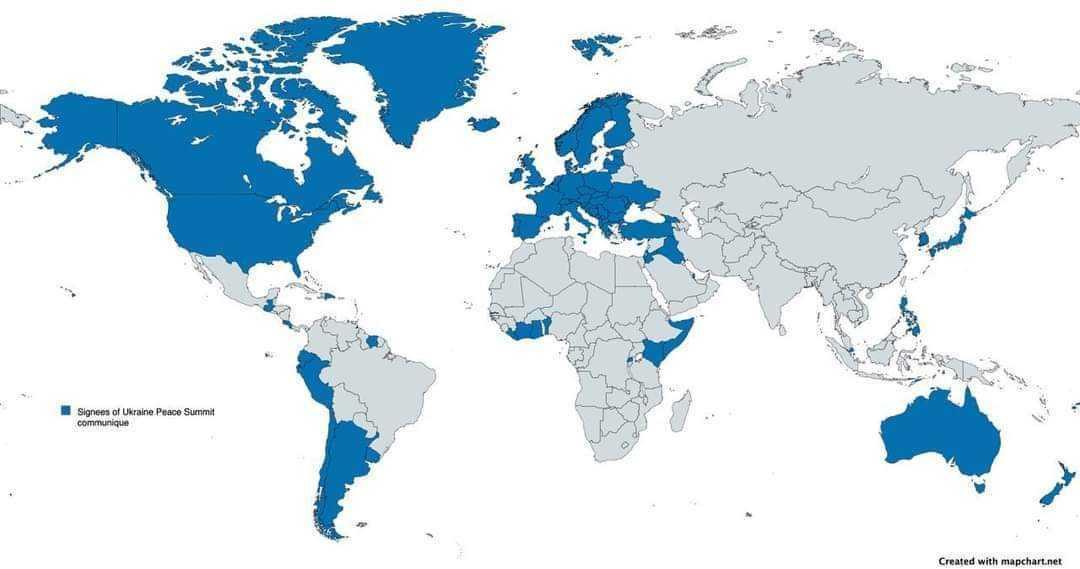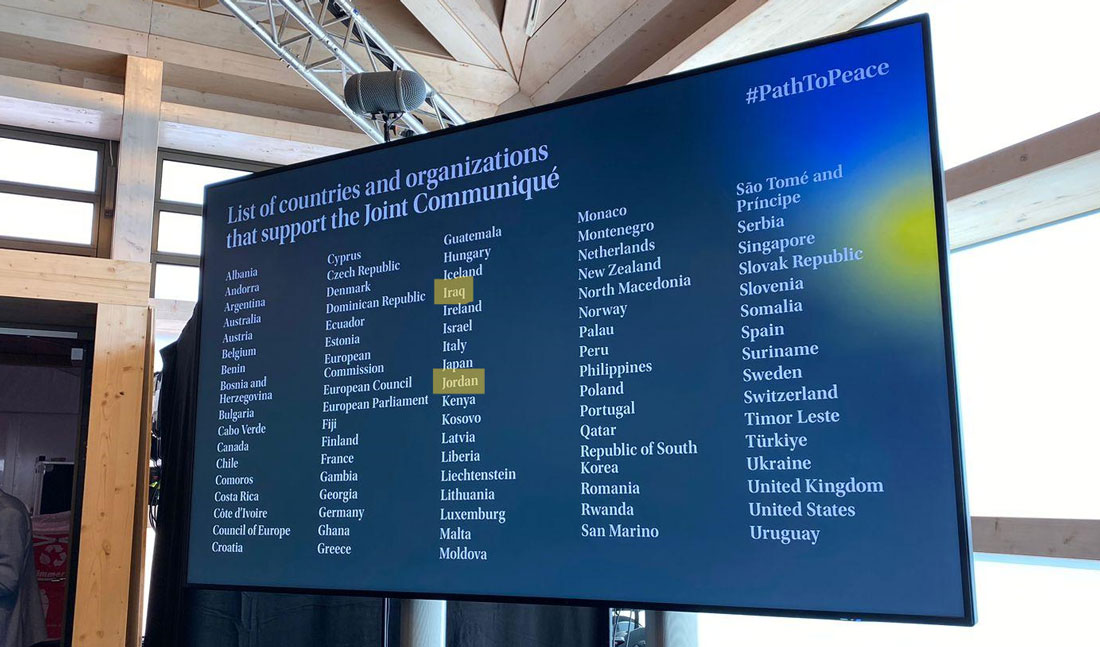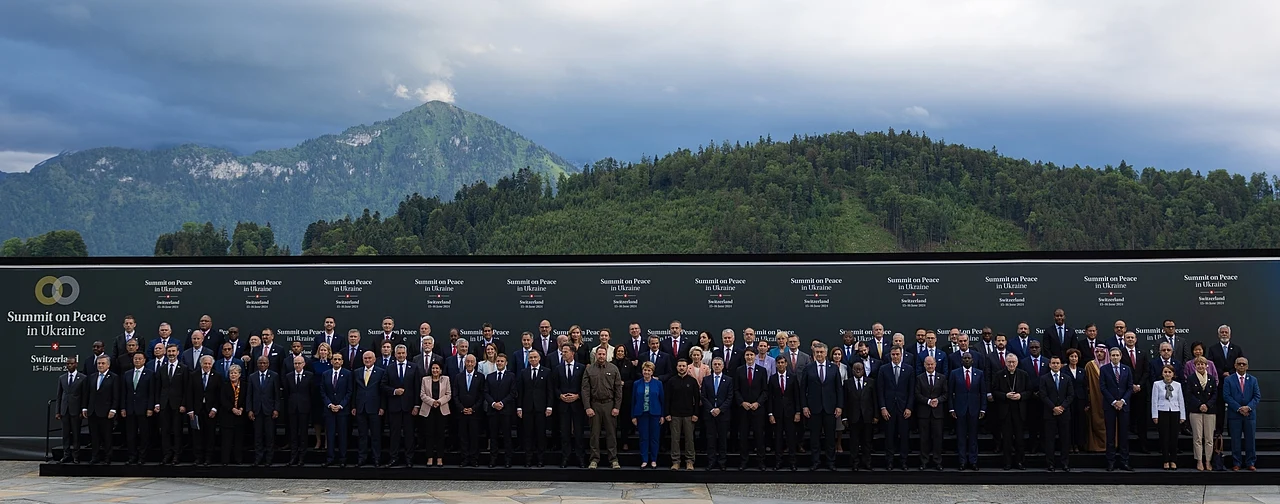On 16 June, representatives of a total of 80 nations signed the Summit's "Joint Communiqué on a Peace Framework," emphasizing Ukraine's "territorial integrity" as essential for any peace deal to end Russia's all-out war. Later, the number of signatory countries dropped to 77.
The Swiss Government stated that the Summit on Peace in Ukraine's primary goal was to initiate a peace process in the country by providing a platform for dialog and outlining a roadmap for engaging all parties involved.
The communiqué
The summit's communiqué emphasized Ukraine's "territorial integrity" as essential for any peace deal to end Russia's all-out war. The document includes only three points of Ukraine's 10-point peace formula - food and nuclear safety, and the release of prisoners:
- Ukrainian nuclear installations, including the Russian-occupied Zaporizhzhia Nuclear Power Plant, must operate safely under Ukraine's sovereign control and IAEA supervision; any nuclear threats or use is inadmissible.
- Global food security requires uninterrupted food production and supply, with critical emphasis on "free, full, and safe commercial navigation" to and from Black and Azov Sea ports; attacks on civilian maritime infrastructure are unacceptable.
- All prisoners of war and deported or unlawfully displaced Ukrainian civilians, including children, must be completely exchanged and returned to Ukraine.
The 10-point peace formula put forward by President Zelenskyy in November 2022 boils down to the following elements:
- Radiological and nuclear safety
- Food security
- Energy security
- Release of all prisoners of war and deportees
- Restoring Ukraine’s territorial integrity
- Withdrawal of Russian troops and cessation of hostilities
- Justice and accountability
- Preventing ecocide
- Preventing escalation of the conflict
- Confirmation of the war’s end.
The Peace Summit's communiqué advocates dialog among all parties to foster a comprehensive, just, and lasting peace in Ukraine. The document doesn't directly urge Russia to withdraw its troops from Ukraine, which one of the most important among the seven points of the Ukrainian peace formula omitted in the communiqué.
The Summit
Over the weekend, Switzerland hosted the Global Summit on Peace in Ukraine, with invitations extended to over 160 countries and organizations.
Earlier this month, President Volodymyr Zelenskyy stated that 106 countries confirmed their participation in the upcoming summit, while China used diplomacy and Russia employed blackmail to discourage other countries from attending.
Before the summit, Russia's President Vladimir Putin demanded that Ukrainian troops withdraw from four Ukrainian regions partially occupied by his forces and called on Ukraine to abandon its plans to join NATO as a precondition for a ceasefire. Commenting on Putin's demands, Zelenskyy said Kyiv would not respond to ultimatums.
A total of 57 countries were represented at the highest level by presidents or prime ministers, 29 by ministers (mostly foreign ministers), and six by ambassadors from Indonesia, Israel, the UAE, South Africa, the Philippines, and Brazil. Brazil and the Holy See attended as observers.
International organizations present included the Council of Europe, OSCE, Organization of American States, and key EU institutions (European Council, Commission, Parliament). The UN and the Ecumenical Patriarchate attended as observers.
Several participants, namely Saudi Arabia, UAE, South Africa, Mexico, India, Armenia, Bahrain, Colombia, Qatar, Indonesia, Libya, and Thailand, did not sign the final document.

Three signatures withdrawn?
During the Global Peace Summit, initially, 80 countries and four international organizations were listed as signatories to the final communiqué, as displayed on a screen during the event on 16 June.

However, Iraq and Jordan later possibly withdrew their signatures, as the signatory list later published on the website of the Swiss Ministry of Foreign Affairs, did not mention the two nations. On the next day, Rwanda disappeared from the list on the Swiss MFA website, but the Ecumenical Patriarchate was included, bringing the total number of signatories to 77 countries and five organizations.
Oleksandr Bevz, an advisor to the head of the Office of the President of Ukraine, reported in an interview with Radio Svoboda. The Office was verifying reports that Iraq and Jordan have withdrawn their signatures from the communiqué of the Global Peace Summit.
Ukrainian leader praises the results
At a press conference after the summit, Ukrainian President Volodymyr Zelenskyy said,
"Independence, territorial integrity and sovereignty were recognized by absolutely all participants of the Summit. The majority of the world. This provides powerful support for Ukraine. This is one of the successes of this Summit.”
He noted that while some countries are still deciding whether to join, he expects more nations to endorse the summit's communiqué over time.
In a June 17 address to the nation, Zelenskyy called the summit Ukraine's success, as "for the first time in our history so many leaders and states have gathered for the sake of Ukraine and for the sake of peace."
On 17 June, Russian Foreign Ministry spokesperson Maria Zakharova claimed that the Swiss summit on Ukraine was a failure. She said that efforts to portray the conference as a globally significant event were ostensibly unsuccessful, and many Global South countries ignored the invitation despite alleged Western threats and blackmail.
Ursula von der Leyen, the head of the European Commission, stated that achieving peace in Ukraine would take time.
“[The summit] was not a peace negotiation because Putin is not serious about ending the war, he’s insisting on capitulation, he’s insisting on ceding Ukrainian territory – even territory that today is not occupied,” she said.
Main issue
Important regional leaders such as Saudi Arabia, India, and South Africa did not support the final declaration, while China, despite being involved in earlier preparatory stages, chose not to participate in the summit at all.
European Pravda (EP) notes that one of the issues of the summit's outcome is the West against the rest division, with the communiqué's backing primarily from nations aligned with Western political ideologies or reliant on the West. The main goal of the peace summit was to complement Western support for Ukraine with additional backing from the Global South.
"Even after narrowing down the list of topics for discussion to the three least controversial items, we were unable to convince the states that we had been trying hard to reach," EP wrote.
Further steps
At the press conference after the summit, Zelenskyy noted that future steps include working meetings to develop a comprehensive plan to end the war, to be unveiled at a second peace summit expected to include Russia. The Ukrainian President pointed out that negotiations could start sooner if Russia withdraws its troops from Ukraine.
Zelenskyy mentioned that national security advisors will continue diplomatic efforts to create a detailed plan addressing the three key areas outlined in the Joint Communiqué on a Peace Framework: food security, nuclear and energy security, and the release of all captured and deported Ukrainians.
In his June 17 address, Zelenskyy noted that his team already has a preliminary work schedule for the summer months regarding the further steps, which include the preparation of the accession of states to the final communiqué of the summit.
Also, he says the preparations are ongoing of"the work of groups on the points of the Peace Formula so that states can unite for the sake of clear specifics, decisions, and action plans." However, it is unclear if this statement concerns all ten points of Ukraine's peace formula or only three of them, mentioned in the communiqué.
Russia's participation
Ihor Zhovkva, Deputy Head of Zelenskyy's Office, stated on Radio Svoboda that Russia could participate in the next peace summit if it is ready to constructively discuss and implement the action plan agreed upon at the first summit.
Meanwhile, Swiss Foreign Minister Ignazio Cassis stated that while it was initially impossible to include Russia in the summit, but there was a promise of its future participation. He also mentioned that Switzerland would engage in detailed discussions of the summit's outcomes with countries that did not attend, such as China.
Read also:
- Text of Ukraine peace summit communiqué finalized, FM Kuleba says
- Three reasons why Ukraine’s Global Peace Summit was a success
- Switzerland peace summit could be self-defeating for Ukraine, leaked draft shows
- Ukraine’s Global Peace Summit kicks off in Switzerland, with 92 countries attending

